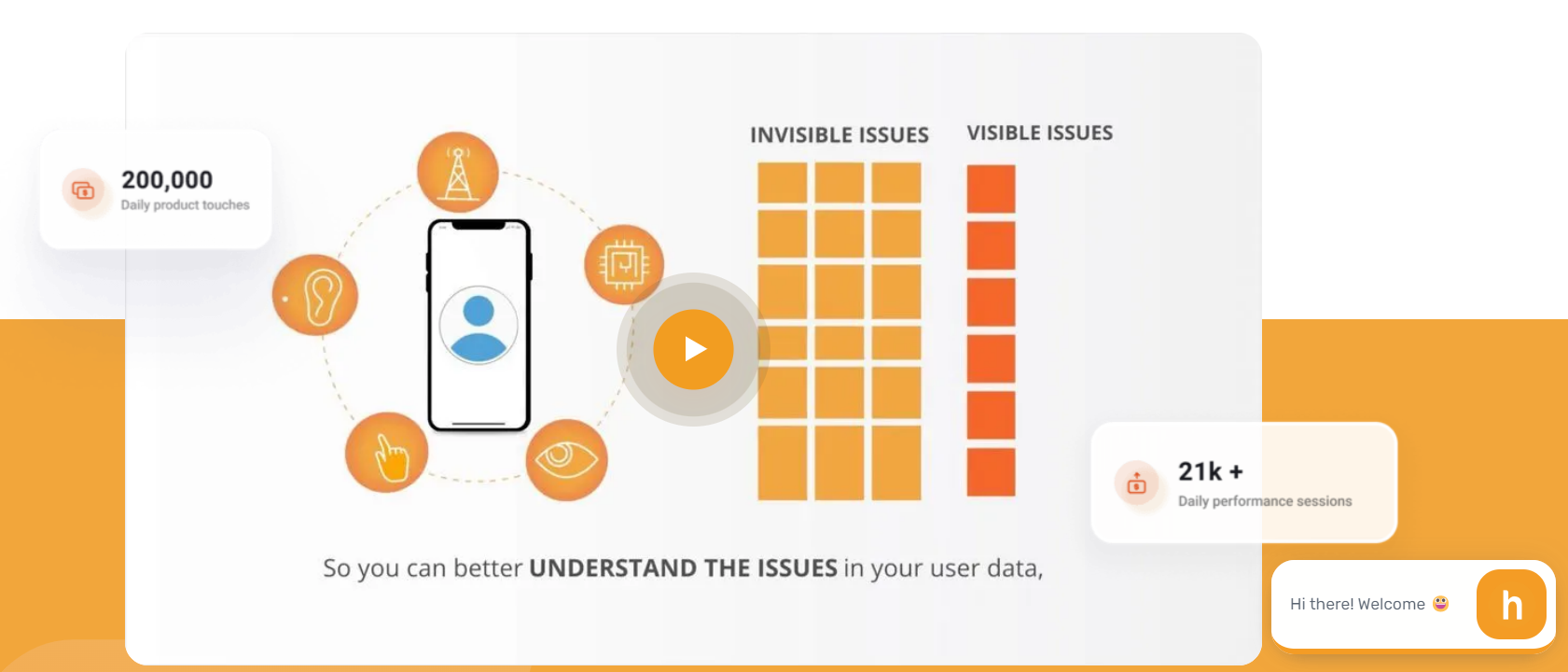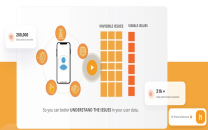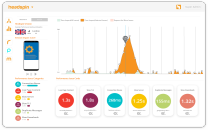
HeadSpin
Founded Year
2015Stage
Acq - Fin | AliveTotal Raised
$81.28MValuation
$0000Revenue
$0000Mosaic Score The Mosaic Score is an algorithm that measures the overall financial health and market potential of private companies.
-70 points in the past 30 days
About HeadSpin
HeadSpin operates a data science-driven platform. It helps businesses identify and fix issues through data science and real-world testing to improve application performance and enhance user engagement. It enables manual and automated application testing with screen and screenless devices, such as mobile phones, desktop browsers, media players, audio devices, and even automotive devices. The company was founded in 2015 and is based in Sunnyvale, California.
Loading...
HeadSpin's Product Videos



ESPs containing HeadSpin
The ESP matrix leverages data and analyst insight to identify and rank leading companies in a given technology landscape.
The load testing market provides solutions for businesses to test their applications and infrastructure for performance under heavy workloads or traffic. Load testing involves simulating high volumes of traffic or requests to an application or infrastructure to evaluate its performance and reliability. With the increasing demand for online services and applications, it has become crucial for busin…
HeadSpin named as Challenger among 10 other companies, including New Relic, Oracle, and OpenText.
HeadSpin's Products & Differentiators
Digital Experience Monitoring Platform
Empowering development, QA, Operations, and product teams to assure optimal mobile, web, audio, and video experiences throughout the app lifecycle
Loading...
HeadSpin Patents
HeadSpin has filed 23 patents.
The 3 most popular patent topics include:
- geolocation
- software testing
- diagrams

Application Date | Grant Date | Title | Related Topics | Status |
|---|---|---|---|---|
5/14/2021 | 8/20/2024 | Broadcast engineering, Videotelephony, Geolocation, Data management, GPS navigation devices | Grant |
Application Date | 5/14/2021 |
|---|---|
Grant Date | 8/20/2024 |
Title | |
Related Topics | Broadcast engineering, Videotelephony, Geolocation, Data management, GPS navigation devices |
Status | Grant |
Latest HeadSpin News
Aug 13, 2024
Best Practices for Mobile App Automated Testing TechRound TeamAugust 13, 2024 As the demand for sophisticated features and smooth user experiences grows, the need for effective mobile app testing has become more essential than ever. Test automation has become a crucial aspect in this field, offering the ability to quickly identify defects, minimise manual testing efforts, and speed up release cycles. This blog will delve into the five essential best practices for automated mobile app testing to ensure you’re optimising your testing processes effectively. Automated testing proves indispensable in the fast-paced mobile app landscape, where users demand flawless performance and swift bug resolutions. It is utilised for: Functional Testing: Ensuring the app and its features operate as expected Regression Testing: Confirming that new code changes don’t disrupt existing functionalities or introduce new bugs Performance Testing: Assessing the app’s behavior under various conditions and loads Compatibility Testing: Verifying that the app performs consistently across different devices and OS versions Integration Testing: Identifying defects in the app’s interactions with third-party programs and APIs Security Testing: Detecting vulnerabilities and weaknesses in the app’s security By automating routine and time-consuming tasks, QA teams can shift their focus to more intricate test scenarios and high-value activities, such as exploratory testing and enhancing user experience. Mobile app automated testing is often the most efficient and cost-effective approach for most testing needs, offering significant advantages: Repeatability: Tests can be executed repeatedly with consistent accuracy Speed: Automated tests perform complex scenarios much faster than manual testers Parallel Execution: Tests can be conducted simultaneously across multiple devices, platforms, and versions Comprehensive Coverage: Automation can handle thousands of test cases per run, delivering extensive coverage that manual testing often cannot achieve Accuracy: Automation cuts down the risk of human error inherent in manual testing Cost Efficiency: Although the initial setup may be costly, ongoing management of automated testing is generally less expensive than manual testing While automation offers numerous benefits, manual testing remains valuable for evaluating UX/UI, user acceptance, and app behavior, where human insight is crucial. More from Tech Implementing automated testing presents challenges, but following critical best practices can help ensure your strategy achieves optimal results. An appropriate test automation framework is essential for a successful mobile app testing strategy. The ideal framework should be user-friendly, flexible, and compatible with your programming languages and platforms. Popular frameworks, such as Appium, Espresso, XCTest, and Calabash. While choosing an automation framework, consider the following factors: Platform Compatibility: Ensure it supports your app’s platforms ( Android app testing , iOS app testing, or both) Language and Framework Compatibility: Match it with your app development languages and frameworks Support for New Devices/OS Versions: Assess how easily it can adapt to new devices and OS versions Test Development Language: Choose a framework that aligns with your preferred language for test development Integration: Verify ease of integration with your existing tools and processes Community Support: Look for solid community support and available resources Selecting the proper framework will streamline your test automation process and set the stage for long-term success. A well-constructed test automation strategy is crucial for achieving effective results. Your plan should encompass the following elements: Clear Goals and Objectives: Determine the objectives of your automation efforts and establish measurable goals to monitor progress Test Case Selection: Choose test cases that are repetitive and time-consuming, as these benefit most from automation Test Case Design: Develop concise tests with fewer steps. Break down complex tests into smaller, more manageable ones to enhance stability and reliability Test Environment: Determine how and where you will execute your tests, considering device types, operating systems, and network configurations Test Coverage: Use analytics to understand your target audience’s devices and operating systems. Based on this data, prioritise test coverage Continuous Integration and Continuous Delivery (CI/CD): Incorporate test automation into your CI/CD pipeline for seamless execution and rapid feedback Creating a robust strategy lays a solid foundation for your test automation efforts and maximises your return on investment (ROI). To enhance the efficiency of your test automation, concentrate on developing test scripts that are modular, reusable, and easy to maintain. Here are some best practices to achieve this: Apply the Page Object Model (POM): The POM design pattern encapsulates UI elements and interactions in separate classes, making your test scripts more resilient to UI changes Organise Test Cases Efficiently: Tailor test case organisation to account for platform-specific requirements, recognising that some tests may apply only to specific platforms Develop Reusable, Parameterised Methods: Develop reusable methods for finding and interacting with app elements, and organise them into a separate class. This promotes code reusability across tests and platforms, streamlining maintenance Implement Data-Driven Testing: Parameterise test scripts to accept input from external sources like Excel files or databases. This increases test flexibility and reduces the effort needed to update scripts when data changes Account for Platform-Specific Features: Identify and address features, such as location or privacy permissions, that may require different test steps based on the platform or operating system Use Parallel Testing: Execute multiple tests simultaneously on different devices or emulators to reduce overall testing time and accelerate the release cycle. By following these practices, you can enhance the efficiency and maintainability of your test automation efforts. Testing mobile apps can be challenging, given the wide array of mobile devices, operating systems, and network configurations. To ensure seamless functionality across diverse environments, adhere to these best practices: Prioritise Functional Testing on Real Devices: Conduct functional testing on actual devices for reliable results, using emulators primarily for UX testing. This approach balances comprehensive coverage with cost and execution time considerations Maintain a Device Lab: Develop a device lab that includes a mix of popular, older devices and various OS versions. This ensures compatibility with the devices most used by your target audience Leverage Cloud-Based Testing Solutions: Utilise cloud-based testing platforms such as HeadSpin or AWS Device Farm . These services offer a broader range of devices and configurations, complementing your device lab and reducing the need for device maintenance and associated costs By following these practices, you can ensure thorough testing across multiple devices and platforms, enhancing your app’s reliability and user experience. Continuous improvement is essential for effective mobile app test automation. To drive success, focus on these critical practices: Monitor Test Results: Regularly review test outcomes from your CI/CD pipeline to spot patterns and trends in test failures Analyse Test Data: Utilise data analytics and visualisation tools to understand test execution, coverage, and effectiveness. This strategy will enable you to make informed decisions and focus on areas needing improvement Produce Reports: Generate comprehensive reports to identify potential application performance and stability issues across various versions, devices, and platforms Iterate and Improve: Based on your analysis, refine your test automation strategy, framework, or scripts to boost their effectiveness and efficiency By consistently monitoring, analysing, and iterating, you can enhance your test automation process and achieve better results. As the demand for top-notch mobile applications grows, automated testing will remain a crucial part of the development process. It is crucial to deliver exceptional quality with each update and feature. HeadSpin’s AI-driven platform stands out by integrating expert QA engineers and strategically selecting metrics to ensure the timely delivery of high-quality software. Its advanced capabilities enable organisations to tackle testing challenges and excel in software development effectively. Related Articles
HeadSpin Frequently Asked Questions (FAQ)
When was HeadSpin founded?
HeadSpin was founded in 2015.
Where is HeadSpin's headquarters?
HeadSpin's headquarters is located at 685 North Pastoria Avenue, Sunnyvale.
What is HeadSpin's latest funding round?
HeadSpin's latest funding round is Acq - Fin.
How much did HeadSpin raise?
HeadSpin raised a total of $81.28M.
Who are the investors of HeadSpin?
Investors of HeadSpin include Partner One Capital, Atlassian Ventures, Google Ventures, Kearny Jackson, ICONIQ Capital and 47 more.
Who are HeadSpin's competitors?
Competitors of HeadSpin include Kobiton, LambdaTest, AuMBER, Sauce Labs, BrowserStack and 7 more.
What products does HeadSpin offer?
HeadSpin's products include Digital Experience Monitoring Platform.
Loading...
Compare HeadSpin to Competitors
Appcelerator is a career mentorship platform focused on enhancing diversity in the healthcare leadership sector. The company offers resources and expert coaching to help underrepresented students and professionals in healthcare improve their technical skills and secure competitive roles. Appcelerator simplifies the job search and application process, providing interview preparation, career guidance, and connections to potential employers. It was founded in 2006 and is based in Mountain View, California. Appcelerator operates as a subsidiary of Axway.

Sofy is a company that focuses on providing no-code testing solutions for mobile applications. The company offers a platform that allows users to run quality assurance tests from continuous integration and continuous delivery (CI/CD) on real devices without writing any code. This platform is primarily used by enterprises, startups, service providers, and channel partnerships. Sofy was formerly known as Smartlytics, LLC. It was founded in 2015 and is based in Bellevue, Washington.
SmartDust specializes in providing a cloud-based platform for mobile device testing within the software development and quality assurance sectors. The company offers services that enable remote access and control of a vast array of mobile devices for manual and automated testing, as well as debugging of mobile applications and websites. SmartDust primarily caters to mobile product teams, developers, and quality assurance professionals seeking efficient collaboration and comprehensive testing solutions. It was founded in 2019 and is based in Warsaw, Poland.

BrowserStack is a software testing platform that specializes in web and mobile application testing across various browsers and real devices. The company offers a suite of services including manual and automated testing, visual review tools, and compliance testing for accessibility standards. BrowserStack serves a broad range of customers, from individual developers to large enterprises, providing tools to improve software quality and streamline the testing process. It was founded in 2011 and is based in Dublin, Ireland.

Kobiton provides mobile device testing solution. The company offers a platform for testing mobile applications on real devices, providing services such as real-device testing, visual testing, mobile performance testing, and mobile accessibility testing. It was founded in 2016 and is based in Atlanta, Georgia.
Appy Pie is a no-code app development platform that enables users to create mobile applications without coding knowledge. The platform offers a range of tools and features for building cross-platform mobile apps that can operate on both Android and iOS devices. Appy Pie's services include an AI-powered app maker for designing apps, real-time updates without the need for reinstallation, app analytics for performance tracking, and monetization options such as in-app advertising and purchases. The company caters to a diverse clientele, including businesses, entrepreneurs, and individuals seeking to develop custom mobile applications. It was founded in 2010 and is based in San Francisco, California.
Loading...